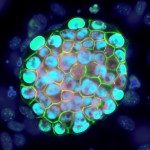Link to Pubmed [PMID] – 8558024
J. Immunol. 1996 Feb;156(3):968-75
The role of the medullary thymic epithelial cells in tolerance induction to MHC class I restricted self peptides has been analyzed by studying the beta-galactosidase (beta-gal)-specific cytotoxic T cell response of a transgenic mouse expressing beta-gal in the thymus, skin, and central nervous system (Tg beta-gal mouse). Our results showed that: 1) beta-gal expression in the thymus was limited in a subpopulation of medullary epithelial cells, and bone marrow-derived thymic cells were beta-gal-1; 2) Tg beta-gal mice did not mount an anti-beta-gal CTL response even in the presence of exogenous IL-2, while Tg beta-gal–>B6 chimeras responded to beta-gal as strongly as NTg beta-gal mice; 3) Tg beta-gal mice did not generate CTL against the immunodominant Kb-restricted beta-gal 497-504 peptide; 4) tolerance was due to the thymic epithelial cells that expressed beta-gal because nude mice grafted with thymus from Tg beta-gal mice were also unable to respond to beta-gal; 5) the Tg beta-gal mouse-derived beta-gal+ medullary epithelial TEC.X10 line presented the Kb-restricted beta-gal 497-504 epitope. In conclusion, these results demonstrate that medullary thymic epithelial cells induce a complete tolerance towards class I-restricted self peptides presented on their own surface.

